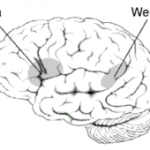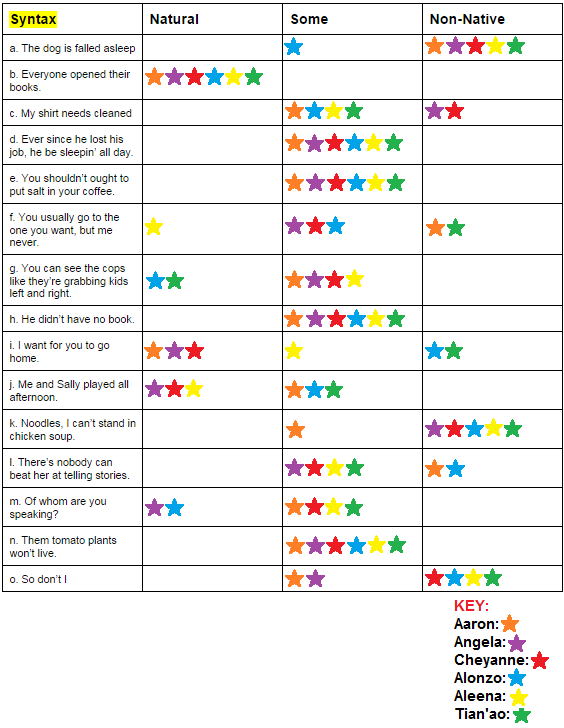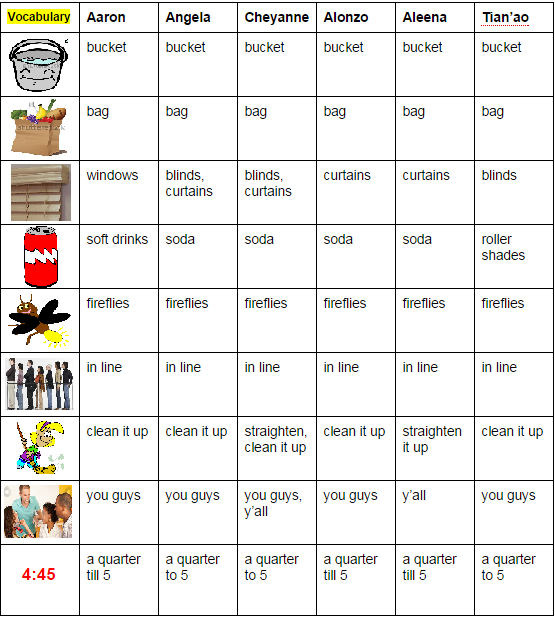Language is Key (HW-4 )
Language is the key to uncovering who we are: the secrets of our past, present, and future!

By: Aaron Hayag, Cheyanne Tarango, Alonzo Garcia, Angela Almeida, Tian’ao Wang, and Aleena Nawabi
At first, we were not exactly sure what to expect doing Homework-4 as a group. What does Language Variation, Culture, Change, and Contact all have to do with each other anyways? What surprised us, however, is how much those variables affected our language and in turn personally affected our lives. Beginning with the very basic was Language Variation. All of us individually answered each question and wrote down how we would respond to them with our language. For instance, we were given English phrases which we had to determine whether the syntax was natural, used by some, or nonnative, and then we were given descriptions of terms which we had to define with a word. Not surprisingly, we ran into a lot of differences. While everyone uses the word ‘bucket’ and ‘fireflies’, there were some differences between the words ‘windows’, ‘blinds’, and ‘curtains’ as well as the phrases ‘clean it up’ or ‘straighten up’. Through this exercise, we saw first-hand the effects of “R.A.C.E.S.” We found that Race/Ethnicity and Region were the most prominent factors that changed our language. For example, everyone uses the word ‘soda’ to describe a carbonated drink while Aaron says ‘soft drink’ since he grew up in the Philippines and that was the term they used. Secondly, we looked at Language and Culture such as politeness and power, and turn-taking rules in speech. Then we went over Language Change, which for us was the most interesting section. We gave our own opinions on how and why language changes and also a closer look at proto-languages. This gave us amazing insights of where our language comes from. We learned that most of our languages came from the Indo-European language. We all agreed that language is an important part of our culture and an important part of who we are so were able to uncover our past by tracing the changes in language. Similarly, by studying Language Change, we got a sense of how language is continually changing and what it might be in the future. Lastly, we looked at language contact and saw how a language can influence another language. Through this assignment, we learned a lot about the elements of the language we speak.
***Language Variation***
p. 444, #14 – Identify the level of linguistic structure where the variation occurs.
Aaron’s Response:
- I think that this is talking about phonology because it talks about phonemes and how some Caribbean English dialects uses different sounds to replace sounds in English.
- Syntax because multiple negation simply deals with words that have negative meaning being placed in the same sentence.
- Phonetics because it talks about how speech sounds are being physically produced.
- Morphological because it just shows different words with the same meaning. Also the words can be seen as free morphemes such as firefly, glowworm, etc.
- Morphological because it mentions the use of suffixes. Suffixes are bound morphemes
- Phonology because it kind of relates to complementary vs contrastive distribution. pen and pin are minimal pairs however some dialects of English are not able to distinguish those two words apart because they can’t pronounce them.
Angela’s Response:
- Phonological
- Syntactic
- Phonetic
- Semantic
- Morphological
- Phonetic
Cheyanne’s Response:
- Phonological
- Syntactic
- Phonetic
- Semantic
- Morphological
- Phonetic
Alonzo’s Response:
- Phonetic
- Syntactic
- Phonological
- Semantics
- Morphological
- Phonological
Aleena’s Response:
- Ph, because if we were to have a chart of the language as we have worked with in the class, we will see that either an assimilation of dessimilation took place between vowels or certain consonants.
- S, if you can draw a syntactic tree, there you will see that multiple negation can take place, just like in progressive perfect past, I have had gone to school for 2 years.
- P, it describes the production of sound, not the change or modification of sound under certain environment.
- Sm,the names of these creatures depends on the regional dialect where both speaker and listener have an agreed understanding in the language.
- M, because it discussing the marks of singularity, tenses, and function of words.
- P, there is a complementary distribution that indicates that both the vowels are allophones of the same phonemes in some regions.
Tian’Ao’s Response:
- I think the first one is Ph. Because this sentence mainly introduces some changes of pronunciation in Caribbean English dialects but doesn’t talk about the physical production of sound.
- Syntactic. Because the multiple negation is the thing about grammar I think.
- Phonetic. This sentence introduces the things about physical production of sound,.
- Mophological. These words all have the same meaning, the differences are just in their morphology.
- Because this sentence clearly points out the suffix, suffix is in the morphological area.
- Phonological.This sentence involves some knowledge about phonemes and allophones . I think this refers to the phonological area.
p. 445, #16 – Natural, Some, Non-Native
Overview of our Response:
Individual Responses:
Aaron’s Response:
a) non-native b) natural c) some d) some e) some f) nonnative g) some h) some i) natural j) some k) nonnative l) nonnative m)some n) some o) some
Angela’s Response:
A. Non-native B. Natural C. Non-native D. Some E. Some F. Some G. Some H. Some I. Natural J. Natural K. Non-native L. Some M. Natural N. Some O. Some
Cheyanne’s Response:
a. Non-native b. Natural c. Non-native d. Some e. Some f. Some g. Some h. Some i. Natural j. Natural k. Non-native l. Some m. Somen. Some o. Non-native
Alonzo’s Response:
A) Some B) Natural C)Some D) Some E)Some F)Some G)Natural H)Some I)Non-native J)Some K)Non-native L)Non-native M)Natural N)Some O) Non-native
Aleena’s Response:
A. Non-Native. Most natives have an understanding of when to use the tense markers. this is found most commonly amongst foreign speakers.
B. Natural. It’s used commonly amongst native speakers.
C. Some. Not every region speaks this way.
D. Some. this is usually spoken in the working class dialect.
E. Some. This is usually used in the Southern region.
F. Natural. Most regions speaks in this non-linear order.
G. Some. I have never heard this expression, so I’m going to guess this is a social dialect.
H. Some. Regional dialect, not common everywhere.
I. Some. Not everyone places a “for” before “you” unless for emphasis.
J. Natural. Most natives use “me” and “I” in this order, but some would say its non-standard.
K. Non-Native. I have no Idea what this statement means, so it must be non-native.
L. Some. Some regional dialects replaces “at stories” with “in stories”.
M.Some. Although this is proper use of “whom” but most natives speak in non-standard.
N. Some. This is a regional dialect.
O. Non-Native. Wrong use of negation, which makes it a syntactical mistake most non-native speakers use.
Tian’Ao’s Response:
a.Non-native b.natural c.some d.some e.some f.non-native g.natural h.some i.non-native j.some k.non-native l.some m.some n.some o.non-native
p. 446, #17 – Vocabulary variation
Aaron’s Response:
a) bucket b) bag c) windows d) soft drinks e) fireflies f) in line g) clean it up h) you guys i) a quarter till 5
Angela’s Response:
A. bucket B. Bag C. Blinds/Curtains D. Soda E. Fireflies F. In line G. Clean it up H. you guys I. A quarter to 5
Cheyanne’s Response:
a. Bucket b. bag c. blinds/curtains d. soda e. fireflies f. in line g. straighten/ clean it up h. you guys/ y’alli. a quarter to 5
Alonzo’s Response:
A) a B) a C) e D) a E) a F) b G) d H) a I) c
Aleena’s Response:
A.aB.aC.eD.aE.aF.bG.aH.cI.c
Tian’Ao’s Response:
a.a b.a c.a d.c e.a f.b g.d h.a i.b
**GROUP DISCUSSION**
From the data we have right now, we seem to be in agreement with most of them. Since the majority of us grew up or have stayed in California for a while, we tend to use the same words to describe certain things such as firefly and bucket. However, we had different opinions regarding whether some phrases/sentences were natural, “some”, or nonnatives. I think the reason for this is because phrases are a bit more complex than words. Words are a bit easier to pick up when you move to a different region but phrases are a bit harder to learn. For example, Aaron lived in the Philippines for 12 years prior to coming to California, Aleena was raised in the East Coast, and Tian’ao is an international student so they had different opinions on the syntax of some phrases. Here, we can see how Race/Ethnicity is playing a major role in how they approach English (very different from Region). Based on our data, however, it does not seem that Sex/Gender affects language as much as Race and Ethnicity since Angela, Aleena, and Cheyanne’s answers are almost the same as Aaron, Alonzo, and Tian’ao’s.
Additional Insights:
Aaron:
I started to acquire some of the words Californians use such as firefly but I still have a hard time determining whether some english phrases are natural or nonnative considering English is only my second language.
Aleena:
Because I am a female who was raised in the East Coast by a White middle class family and my language was shaped by my mother which was a female; my data differ in some aspects with my group members.
For insistence:
The word “curtains” and “windows”, most Californians I have interacted with call shutters as blinds and curtains as windows. These term shifts are due to two factors, regional dialect differences and ethnicity
The phrase “clean it up”, is used by most young females and most male speakers. As an older female speaker, organization and complete clutter free is considered cleaned, so the phrase “straighten out” or “tidy up the room” is used to indicate complete and ultimate cleanliness. These Phrases are determined by two factors, Gender differences and age.
Tian’ao
I’m an international student and English is not my first language,so I don’t know a lot about English dialects and the words preference in different districts. Just from the book I know a little knowledge about words difference. For example, the people in the north of America and New England prefer to call a sweetened carbonated beverage pop In the south, people usually call that as coke and people who living in Appalachia like to use dope as that kind of beverage’s name.
As for the social factors which influence the words variation, I just talk about the age variation as far as I know.Younger speakers use the new variants to a much higher degree than older speakers do;for example, the introduction of new words always be popular much more soon in younger speakers.
***Language & Culture***
make brief notes about:
p. 479, #1, #2, #3
#1 Politeness, Speaker Roles, Turn-Taking Rules
#2 Cultural Competency, is the ability to interact and communicate according to cultural norms. Linguistic Competency is the system of linguistic knowledge possessed by native speakers of a language. Linguistic Performance, the way the language system is used in communication.
#3 Adjacency pair is a type of turn-taking. It is the smallest unit of conversational exchange.
a. What are you up to? Nothing.
b. What are we doing to tomorrow night Brain? Same thing we do every night Pinky.
c. Would you like a cup of tea? Yes please.
d. Would you like some sugar with that? Yes, two teaspoon please.
e. Would you like a drink? No thank you.
#1.Power in conversation,politeness,ethnography
#2.Cultural competence means a kind of capacity to use English according to different cultural rules including native custom and method of expression. In contrast, linguistic competence has its own standard with language knowledge. The performance means the use of language in communication.
#3 Adjacency pair is a kind of conversational exchange
a.Heya!Oh, hi.
b.Would you like to go to the park with me this evening? I’d love to.
c.Thankyou so much. You are welcome.
d.It’s awfully cold here. Oh,sorry, I will close the window.
e.See you. Yeeah, see you later.
p. 480, #15
#15 Power Relationship is established when one speaker makes direct statements; for example,
Give me that cup.
Would you like to give me that cup?
A few years ago we only had two Libyan families living in Rancho Penasquitoes, the Buzerbie and the Ahmed. However, every time the Ahemd family would enter a room, it felt like there were a thousand of Libyans. They were very loud and they made sure they were consistent in their tone, just in case the deaf in China didn’t hear them well. I think they exerted most of their power by their loudness and no matter how soft spoken you were, you find yourself in a shouting match with the Ahemds, because you feel inferior compare to their massive volume.
I think these cues are both inherent and socially determined. Either they were programed from birth to be that loud and dominating or they learned the only way they can be heard is by being loud.
p. 482, #28, #29
#28 a. Etic, I extend my arm towards a friend. They extend their arm towards me. Both hands stretch and touch one another’s hands. The hands closes on each other while the arms are being pulled up and down. Both parties smile and exchange few words. Hands are open and arms are pulled back to its orgin.
Emic, friends greet each other with a huge smile and a very long hand shake.
b. Etic, I picked up a round green fruit and put it in my mouth. My mouth closes and moves up and down and repeats till my hand puts more of the round green fruit in my mouth. I looked to the right and exchanged words then took the round green fruit and placed it in my palm. Hand and arm pulled back and swung the fruit. The fruit travels from my hand to the mouth of the person who spoken to.
Emic, I was chewing on some grapes until one of my friends to the right of me said “hey do you think you can throw some in my mouth” and I said “heck yea.” So my friend opened his mouth and swish goes the grapes in his mouth.
c.Etic, A man moves his right foot left foot, right foot left foot, right foot left foot. Stops in the center and picks up the arms and joins both hands in the middle. He begins moving his mouth.
Emic, Handsome young man in his early 30s enters the room excitedly. He intertwines his hands and begins the day with “I hope you all had a great weekend.” And the class responds with joy and some with misery.
#29 Passive Observation, is observing from a distance without being involved in the activities; for example, observing monkey behind the glass walls.
Participant Observation, is observing from a distance and also getting involved the activity; for example, learning a new language, you not only watch how people of the language speak to each other but also speak to them.
***Language Change***
p. 557, #10, #14
#10 Even though we do not have written records of it, we know that there was a proto-Germanic language simply because of language relatedness. If we look at the majority of today’s Germanic languages we can see similarities within them (this can either be phonological, phonetic, semantic, morphological, or syntactic). The term “genetically related” is what you call languages that are similar to each other. They are called as such because they were all the same language at one point but later broke off into separate languages due to various reasons such as geographical boundaries and contact with other languages. For instance, two germanic language can have cognates which supports the idea that they are related and came from this one universal language: proto-Germanic. While there are indeed instances where two languages will coincidentally share some elements, it is more likely that two languages will have similarities because they came from one language and this is how we know that there was a proto-Germanic language.
#14 We spell the words knife and knight with a <k> when they are pronounced with a an initial alveolar nasal because the speakers of Old English used to pronounce the letter <k> in those words (unlike modern english speakers which makes it a silent letter). This is an example of a sound change, specifically a conditioned sound change because not this only occurs when the letter <k> is placed before the letter <n> in the beginning of a word. Sound change occurs when the phonetic of a sound is altered. As the English language continued to change, people simply found it much easier to say words that begin with the letters “kn-” by making the letter <k> silent. This is what we would call Deletion which is a type of sound change. Additionally this is only a phonetic change because it only affects how we pronounce words like knight and knife. knock, kneed, etc.
p. 561, #22
Aspects of English morphology that currently show some degree of fluctuation and variation:
- cleaved versus cleft as the past tense of cleave
- creeped versus crept as the past tense of creep
- sleeped versus slept as the past tense of sleep
- shrinked versus shrank versus shrunk as the past tense of shrink
In these four examples, we can see how influential and prominent the analogical process is in causing these fluctuations. Since the formula of VERB + ed is seen that regular or most normal thing to do in English, speakers tend to want to make a proportional analogy of irregular verbs. For example, shrinked just so sounds so much better and normal than shrank or shrunk because of this proportional analogy.
p. 562, #29
- There are a wide variety of terms related to computers and computer actions, but it all depends on your level knowledge of computers. Some words related to computers that are considered to be old but have now been put to new use include; mouse, program, hack, keyboard, and code. Some terms that were introduced by computers and are new words and phrases include; download, powerpoint, search engine, internet, e-mail, Wi-Fi, and laptop/desktop. New words are created and old words are given new meanings, because as time passes new environments are created by factors such as technological innovation, and certain language is created to represent the innovation, while some language is recycled based on the region where the term is being used.
- The word mouse went through a metaphorical extension because the computer device has similarities to the rodent which the word originally represented. Program originally meant a planned series of events, items, or performances, while now it means to provide a computer with instructions to complete a task. This makes the semantic change a reduction because it went from a general term of planned events to a specific definition of coded instructions, and this occurred because it is a very specific action. Hack originally meant to cut roughly, however now it means to gain unauthorized access to data through a computer, making the semantic change a degradation because some frown upon it because it could be performed for criminal purposes, and this occurred because it is used as a negative phrase. Keyboard was originally a set of keys on a piano and like-instruments, however it is now the set of keys that control a computer, therefore making the semantic change a metaphorical extension because the keys on a computer keyboard are similar to those of a piano as you press down on them. Code on a computer mean program instructions, while originally they were a set of symbols used to represent something, making this semantic change a reduction because it went from a general term of symbols to a specific set of instructions on a computer.
p. 563, #33
- Cynic: a member of an ancient Greek school of philosophy who believed in self-control. The term has undergone degradation as it is now defined as a person who believes that people are only motivated by self-interest.
- Hacker: a person or something that cuts roughly. The current definition is someone who gains unauthorized access to data through a computer, therefore the term went through degradation.
- Anecdote: obscure biographical or historical account. This term changed through reduction as it is now defined specifically as a short account of an interesting or amusing incident or event.
- Grotesque: a form of decorative art consisting of weaving human and animal forms with flowers and foliage. This term underwent degradation as the term is now defined as an ugly, repulsive, or distorted figure.
- Parakeet: a single species of tropical birds. This term underwent extension as it now represents over 100 species of tropical and colorful parrots.
- Leer: to glance over one’s cheek, or to look sideways. This term underwent degradation as the definition is currently to look or gaze in an unpleasant, malicious, or lascivious manner.
- Captivate: to seize or capture. Elevation occurred because the definition now means to attract the attention of someone, or to charm.
- Paisley: a town located in Scotland known for creating the paisley design. The term underwent extension as it is now generally defined soft wool patterns containing abstract figures.
***Language Contact***
p. 513, #12
We don’t think extensive borrowing is a threat to a language nor do we see it as a benefit to a language. We simply think that it is unnatural and impossible to stop a language from changing because language is something that will change no matter what. Contact with other languages is one of the factors that affects language change and that is the case with borrowing words for English. Almost all languages in this planet were formed or has been affected by other languages in one way or another. One way American English is different from British English is that it borrows Spanish words, and that is what makes American English unique. We think that it is best to let language change the way it wants to instead of limiting it.
p. 516, #22, #23
#22 In the Belize Creole text, we were able to pick out a lot of words that almost sound the same as words in English. For example: wans = once, apan = upon, taim = time, taiga = tiger, haus = house, aredi = already, oke = okay, den = then, gaan = again, and les go = let’s go. However, it was still very difficult for us to decipher what was actually happening in the story even when we were able to familiarize ourselves with the majority of the words. Semantically, it was really easy for us to pick out words one by one and predicting what they meant but syntactically, we had no idea what the whole story was about!
#23 The Hawaiian Creole English text was much easier to understand than the Belize Creole text. We generally had a good understanding on what the whole text was about, although the actual content of it was slightly unusual. For example, the first sentence looked very similar to American English: “…get many peoples on dees island who stay tink I outa be een som pupule hospeetal.” ‘Hospeetal’ obviously means hospital, ‘peoples’ is ‘people’, and the rest was spelled the same way we would: ‘get’, ‘many’, ‘island’, etc. We think Hawaiian Creole English is much easier to understand for American English speakers because Hawaii has had much more contact with the American English language than Belize. Since this text pretty much shows how some of the words are borrowed from American English.
p. 517, #29
We agree that it is a worthwhile effort to prevent endangered languages from dying out and revive dormant languages. As stated by the comments from people of the Miami tribe, we also believe that language is a defining as well as a unifying element of a culture. In one of the videos we had to watch for Linguistics class, “The Story of English Program 2 The Mother Tongue,” it talks about a small place called “Brittany” and the people there form a tight-knit community through their language. One interesting element depicted in the documentary was that even though the citizens can converse in English, they do it with a thick Welsh accent. Just like those people, we think that language is just as important as the tradition, religion, food, and clothing of a culture, and that is why it is worthwhile to protect them from dying out.







 D5 Creation
D5 Creation
Comments are Closed